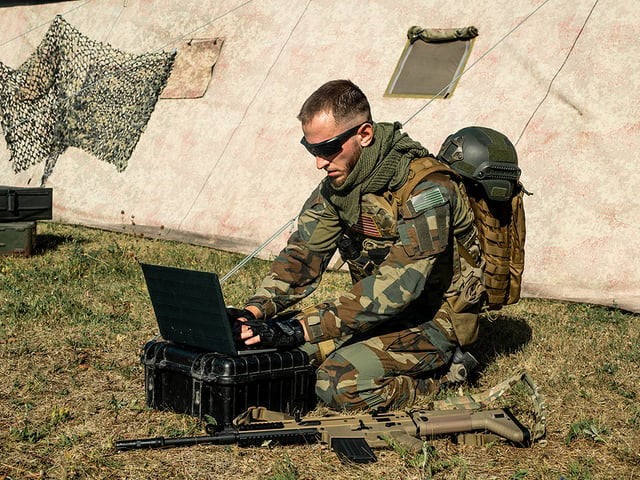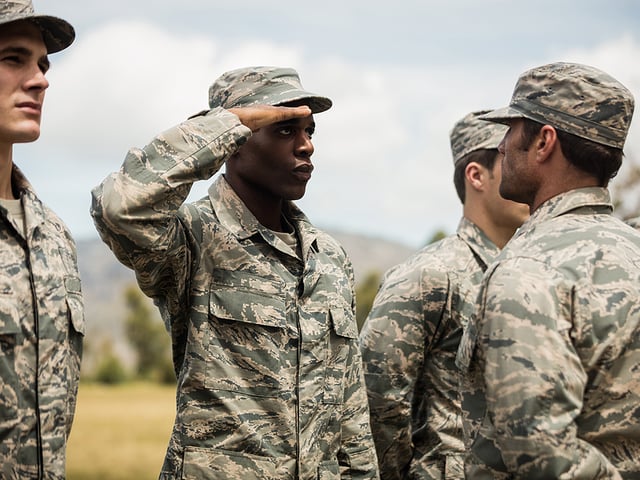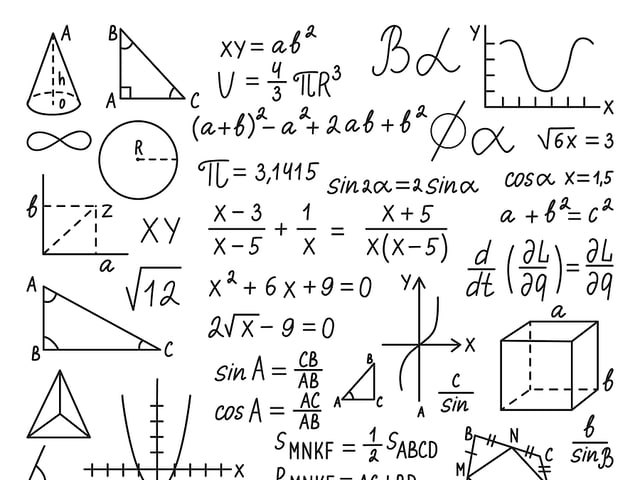
Military MOS Codes
Military Occupational Specialty (MOS) codes are an integral part of the U.S. military’s organizational structure. These codes, made up of alphanumeric characters, serve as a precise method to classify and designate the multitude of job roles that exist within the service branches.
The concept of categorizing military roles isn’t new. Over time, as the military expanded and jobs became more specialized, there was a need to systematically classify each role. The MOS code system was the answer to this evolving requirement.
Each MOS code is unique and typically consists of a series of numbers followed by a letter. For example, in the U.S. Army, “68W” designates a Combat Medic. The specific combination of numbers and letters allows for hundreds of distinct classifications.
While the term “MOS” is commonly associated with the Army and the Marine Corps, other branches have their own versions and terminologies for job classification, such as the Navy’s “ratings.”
The list of MOS codes isn’t static. As the military’s needs change, new MOS codes can be added, and older ones can be phased out or merged, ensuring the system’s relevancy.
Why are MOS Codes Important?
The significance of MOS codes within the military’s structure cannot be understated. One of the primary advantages is the ability to facilitate streamlined training. With each MOS possessing distinct training needs, the military has the flexibility to develop detailed curriculums tailored to every specialty. Whether it revolves around in-depth technical expertise, rigorous physical drills, or cultivating leadership aptitudes, the training is crafted to cater explicitly to the specific requirements of each MOS. Additionally, a uniform MOS system enables efficient resource allocation. Whether the need is for skilled instructors, specialized equipment, or dedicated training facilities, the resources can be systematically distributed based on the unique demands of each MOS.
Beyond training, MOS codes play a pivotal role in ensuring assignment efficiency. During crucial deployments or when roles at bases need filling, commanders have the advantage of quickly pinpointing the right personnel for specific tasks or missions, thanks to the MOS codes. Furthermore, when the situation demands the formation of specialized teams, a comprehensive knowledge of MOS codes ensures that teams are assembled with a harmonious blend of skills, paving the way for mission success.
From a career perspective, these codes serve as a guiding light for service members. They offer a clear roadmap, showcasing potential career trajectories and shedding light on roles that might be within reach with added experience or training. Understanding the nuances of MOS codes empowers service members to aim for merit-based advancements. They can identify and then work towards acquiring the competencies associated with more advanced roles. Additionally, a thorough understanding of these codes opens doors to opportunities across different military branches, simplifying inter-service transitions.
In essence, by introducing a meticulous structure to job roles and fostering clear career pathways, the MOS code system has cemented its place as a fundamental pillar of the military’s organizational framework. It instills clarity, direction, and a profound sense of purpose in every individual donning the uniform.
Service Branch Differences
Understanding the classification systems that each service branch utilizes is crucial, not only for those considering a military career but also for anyone aiming to understand the vast organizational structure of the U.S. Armed Forces.
Army MOS Codes
The U.S. Army categorizes its diverse range of roles using Military Occupational Specialty (MOS) codes. These alphanumeric codes not only define the specific job and duties a soldier is trained for but also help streamline administrative and organizational processes within the Army’s vast infrastructure. Some MOS codes in the Army include:
| MOS Code | Title | Description |
|---|---|---|
| 11B | Infantryman | The backbone of the Army, responsible for defending against land threats. |
| 12B | Combat Engineer | Specializes in construction, demolition, and mine warfare. |
| 12W | Carpentry and Masonry Specialist | Performs construction and maintenance tasks related to woodwork and masonry. |
| 13F | Fire Support Specialist | Provides intelligence on enemy location for artillery and air strikes. |
| 14E | Patriot Fire Control Enhanced Operator | Operates the Patriot missile system to engage enemy air threats. |
| 15Q | Air Traffic Control Operator | Manages the safe take-off and landing of military aircraft. |
| 15T | UH-60 Helicopter Repairer | Specializes in the maintenance of UH-60 Black Hawk helicopters. |
| 15W | Unmanned Aircraft Systems Operator | Pilots and manages drones for reconnaissance and combat missions. |
| 17C | Cyber Operations Specialist | Protects and defends U.S. Army cyber networks. |
| 19K | M1 Armor Crewman | Operates the Army’s main battle tank, the M1 Abrams. |
| 21D | Diver | Conducts underwater reconnaissance and salvage operations. |
| 25B | Information Technology Specialist | Deals with military computer systems and operations. |
| 25C | Radio Operator-Maintainer | Ensures radio communications are available at all times. |
| 31B | Military Police | Provides law enforcement on bases and combat zones. |
| 35M | Human Intelligence Collector | Responsible for information collection operations. |
| 35Q | Cryptologic Cyberspace Intelligence Collector/Analyst | Collects and analyzes digital data to support military operations. |
| 37F | Psychological Operations Specialist | Analyzes and develops tactics to influence foreign target audiences. |
| 42A | Human Resources Specialist | Maintains personnel records and offers administrative support. |
| 68A | Biomedical Equipment Specialist | Maintains medical equipment for the Army. |
| 68W | Health Care Specialist | Often referred to as Combat Medic, they provide emergency medical treatment. |
| 74D | Chemical, Biological, Radiological, and Nuclear (CBRN) Specialist | Responds to CBRN threats and manages protective measures. |
| 88M | Motor Transport Operator | Responsible for the safe transport of goods and troops on the battlefield. |
| 89D | Explosive Ordnance Disposal Specialist | Identifies, neutralizes, and disposes of hazardous munitions, IEDs, and other explosives. |
| 92F | Petroleum Supply Specialist | Manages the reception, storage, and shipping of bulk or packaged petroleum products. |
| 92G | Culinary Specialist | Prepares and serves food for soldiers. |
| 92Y | Unit Supply Specialist | Supervises or performs tasks involving upkeep of supplies and equipment. |
| 94E | Radio and Communications Security Repairer | Maintains radio and communications equipment. |
Marine Corps MOS Codes
The Marine Corps, while similar in structure to the Army’s MOS system, has its own set of codes. Some examples include:
| MOS Code | Title | Description |
|---|---|---|
| 0311 | Rifleman | The primary infantry unit in the Marine Corps, engaging with the enemy in direct combat. |
| 0321 | Reconnaissance Marine | Specializes in reconnaissance, gathering intelligence directly from the field. |
| 0331 | Machine Gunner | Operates large caliber machine guns and provides heavy fire support. |
| 0341 | Mortarman | Manages and fires mortars during combat operations. |
| 0351 | Infantry Assault Marine | Operates advanced infantry weapons, such as rocket launchers, and demolitions. |
| 0352 | Anti-Tank Missileman | Operates anti-tank missiles to engage armored enemy forces. |
| 0651 | Cyber Network Operator | Responsible for network communication, ensuring secure and stable connections. |
| 0689 | Cyber Security Technician | Focuses on protecting Marine Corps cyber infrastructure from threats. |
| 0811 | Field Artillery Cannoneer | Operates field artillery guns, providing indirect fire support. |
| 0844 | Field Artillery Fire Control Man | Responsible for operations of fire direction equipment in field artillery teams. |
| 0861 | Fire Support Man | Acts as liaison between the infantry and artillery to coordinate firepower. |
| 1371 | Combat Engineer | Specializes in construction, demolition, and combat logistics. |
| 1391 | Bulk Fuel Specialist | Responsible for receiving, storing, and distributing fuel. |
| 1833 | Amphibious Assault Vehicle Crewman | Operates and maintains amphibious vehicles for ship-to-shore operations. |
| 2111 | Small Arms Repairer/Technician | Maintains and repairs infantry weapons. |
| 2141 | Assault Amphibious Vehicle (AAV) Repairer/Technician | Maintains and repairs amphibious vehicles. |
| 2147 | Light Armored Vehicle (LAV) Repairer/Technician | Repairs and maintains light armored vehicles. |
| 3043 | Supply Administration and Operations Specialist | Manages and tracks supplies and equipment for the Marine Corps. |
| 4421 | Legal Services Specialist | Assists in legal matters, handling documentation and administrative tasks. |
| 4612 | Combat Photographer | Captures still photographs for operational and public affairs use. |
| 5524 | Band Musician | Performs in the Marine Corps Band, representing the Marine Corps in musical events. |
| 5811 | Military Police | Provides law enforcement, security, and ensures order within Marine Corps installations. |
| 5821 | Criminal Investigator | Conducts investigations related to potential crimes within the Marine Corps. |
| 5939 | Aviation Communication Systems Technician | Repairs and maintains aviation communication systems. |
| 5948 | Avionic Micro-Miniature/Instrument and Cable Repairer | Focuses on the detailed repair of complex avionic equipment. |
| 7041 | Aviation Operations Specialist | Deals with flight operation plans, keeping detailed records of Marine Corps aviation missions. |
| 7234 | Air Control Electronics Operator | Manages and operates systems for air traffic control and surveillance. |
| 7251 | Air Traffic Controller | Directs aircraft in the airspace and on the ground at airfields. |
| 7314 | Unmanned Aerial Vehicle (UAV) Operator | Pilots and manages drones for reconnaissance and other missions. |
Air Force
The Air Force underwent a shift in its coding system but retained its code structure. Initially, they used the Air Force Specialty Codes (AFSC). Examples of the current system include:
| AFSC Code | Title | Description |
|---|---|---|
| 1A0X1 | In-Flight Refueling | Specialists who operate the equipment to refuel planes during flight. |
| 1C3X1 | Command Post | Operates and manages command centers, coordinating missions and relaying commands. |
| 1N4X1 | Fusion Analyst | Analyzes and fuses intelligence from various sources to support operations. |
| 1T2X1 | Pararescue | Specialized in both trauma medicine and rescue operations. |
| 2A5X1 | Aerospace Maintenance | Handles the maintenance of aircraft. |
| 2E1X3 | Satellite, Wideband, and Telemetry Systems | Operates and maintains satellite systems to support communication. |
| 2F0X1 | Fuels | Manages and handles aviation and ground fuels. |
| 2T3X1 | Vehicle Maintenance | Responsible for the inspection, repair, and maintenance of vehicles. |
| 3D0X2 | Cyber Systems Operations | Ensures the integrity of the Air Force’s cyberspace. |
| 3D0X3 | Cyber Surety | Protects and defends Air Force networks against cyber threats. |
| 3E8X1 | Explosive Ordnance Disposal | Handles, disarms, and safely disposes of explosives. |
| 3N0X2 | Broadcast Journalist | Produces and broadcasts Air Force related radio and television programs. |
| 4B0X1 | Bioenvironmental Engineering | Provides expertise about environmental health and hazards. |
| 4E0X1 | Public Health | Monitors and promotes practices to maintain Air Force health standards. |
| 4N0X1 | Aerospace Medical Service | Provides inpatient/outpatient care and aeromedical evacuation support. |
Navy and Coast Guard
Instead of the MOS system, these branches utilize “ratings.” While the underlying idea is similar, the naming convention is distinct. Some ratings include:
| Rating | Title | Description |
|---|---|---|
| BM | Boatswain’s Mate | Responsible for maintaining the ship and its equipment. |
| HM | Hospital Corpsman | Provides health care to sailors and marines. |
| ET | Electronics Technician | Deals with a wide array of electronic equipment and systems. |
| OS | Operations Specialist | Coordinates the information flow in the ship’s combat information center. |
| MA | Master-at-Arms | Provides security and law enforcement, both ashore and at sea. |
| AG | Aerographer’s Mate | Focuses on meteorology and oceanography, providing weather information. |
| CT | Cryptologic Technician | Specializes in communication, translation, and interpretation of information. |
| YN | Yeoman | Offers administrative and clerical support. |
| QM | Quartermaster | Specializes in navigation, handling the ship’s log, and ship’s compass. |
| STG | Sonar Technician, Surface | Operates sonar systems and underwater fire control systems. |
| MM | Machinist’s Mate | Maintains and operates various equipment, such as steam turbines and reduction gears. |
| EM | Electrician’s Mate | Is responsible for the operation and maintenance of a ship’s electrical power generation systems. |
| CS | Culinary Specialist | Prepares and serves meals to the crew. |
| LS | Logistics Specialist | Manages supplies, shipping, and receiving. |
| IT | Information Systems Technician | Manages, processes, and troubleshoots military computer systems and operations. |
How to Choose the Right MOS
Choosing the right Military Occupational Specialty (MOS) is crucial for a fulfilling military career. The right MOS aligns with both your interests and your strengths. Here’s a step-by-step guide to help you make an informed decision:
1. Assess Your Interests and Strengths
Begin with introspection. Reflect on your hobbies, courses you enjoyed in school, or tasks you naturally excel at. Do you find satisfaction in troubleshooting electronic gadgets? An MOS in communications or electronics might be up your alley. If you’re someone who thrives in high-adrenaline situations, a combat or reconnaissance MOS might be your calling. Conversely, if you love being near or in the water, the Navy or Coast Guard MOS options might intrigue you.
2. Research
Don’t just stop at introspection. Use the internet to your advantage. On our website, we’ve curated a comprehensive database detailing every MOS. From the daily responsibilities, skills required, to the training involved – it’s a one-stop resource to understand the nuances of each MOS. Take the time to read through and jot down those that resonate with you.
3. Physical and Mental Aptitude
Your interests can guide you towards a particular MOS, but it’s essential to gauge whether you meet the physical and intellectual requirements of the role. This is where the Armed Services Vocational Aptitude Battery (ASVAB) comes in. Your ASVAB scores will indicate which MOSs you’re qualified for. If you have an MOS in mind, work towards achieving the necessary score on the ASVAB.
4. Consult with a Recruiter
Recruiters are the bridge between civilians and the military world. They possess an in-depth understanding of the MOS system and can provide valuable insights tailored to your profile. Share your ASVAB scores, physical fitness levels, and MOS preferences. Their expertise can guide you to an MOS that aligns with your strengths and aspirations.
5. Vision for the Future
Think long-term. Where do you see yourself after your military service? If you aspire for a civilian career in a specific domain post-military, choose an MOS that imparts skills transferable to that domain. For instance, if you dream of a career in aviation, an MOS related to aircraft maintenance or operations could provide valuable experience.
Choosing the right MOS is a decision that will shape your military journey and potentially your post-military career. Take your time, seek advice, and choose wisely.
MOS Codes: The Start of Your Military Career
The military’s organizational intricacies become more navigable and coherent through Military MOS codes. For every individual eager to serve, these codes signify more than just roles. They illuminate specific paths that resonate with ambitions, duties, and unique chances to contribute to the nation’s defense.
But choosing your MOS isn’t only about aligning with interests; it’s also about strategic foresight. Ponder on the long-term impact of your choice. What expertise will you gain? How will these skills transition to civilian roles, should you venture outside active duty? Are there clear trajectories for growth and advancement within your chosen MOS?
As you find yourself at this pivotal juncture, keep in mind that our platform is committed to your success. We’ve crafted an extensive ASVAB prep course that delves deep into all the requisite topics, ensuring you’re not just prepared, but are also well-equipped to ace the exam. This course, along with our ASVAB practice tests and study guides, is designed to help you qualify for the MOS of your dreams, making sure you meet the standards required for any role you desire. Each resource aims to bolster your confidence and readiness, ensuring a smooth transition into your military career.
In the vast sea of opportunities the military presents, let the beacon of MOS codes guide you. It’s not just about choosing a job – it’s about choosing a vocation, a purpose, and a journey. So, take a thoughtful pause, equip yourself with information, and step forward with determination and clarity. Your service and journey in the military deserve nothing less.
Keep Reading

Armed Services Vocational Aptitude Battery Blog
What is the ASVAB Test?
The Armed Services Vocational Aptitude Battery, known as the ASVAB, is …

Armed Services Vocational Aptitude Battery Blog
U.S. Army Height and Weight Standards for Females
The U.S. Army’s commitment to maintaining a robust, physically fit, and…

Armed Services Vocational Aptitude Battery Blog
Important Math Formulas to Know for the ASVAB
What Type of Math Is on the ASVAB? Mathematics for the ASVAB test is m…